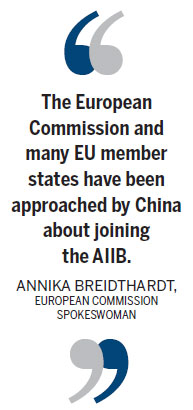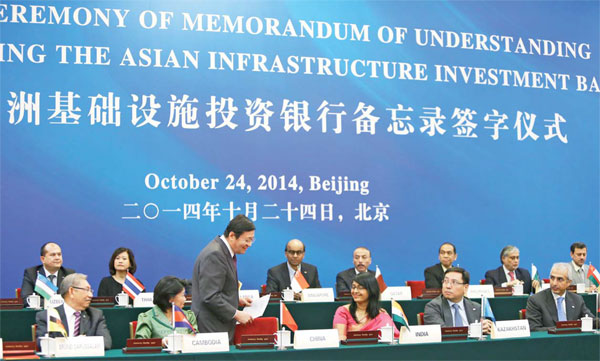New bank will build bridges between Europe and Asia
Updated: 2015-04-03 07:27
By Fu Jing(China Daily Europe)
|
|||||||||||
EU membership will bring global benefits, Experts say
With most European powers applying to become part of the Asian Infrastructure Investment Bank, China has approached the European Union on joining the new institution, but the EU has hinted that only member states should get involved.
Some analysts say the EU will not join the AIIB because it is not a member of the World Bank and Asia Development Bank. Others say the EU should not miss the chance to reform the international financial system.
|
The signing ceremony of memorandum of understanding on establishing the Asia Infrastructure Investment Bank opened on Oct 24 last year in Beijing. Provided to China Daily |
"The European Commission and many EU member states have been approached by China about joining the AIIB," European Commission spokeswoman Annika Breidthardt told China Daily before the March 31 membership application deadline.
"Internal discussions are continuing on how to coordinate positions among member states."
With the United Kingdom taking the lead, France, Germany, Luxembourg, the Netherlands, Denmark, Switzerland and Italy have submitted applications to become founding members of the bank.
"A common approach would put the EU in a stronger position to ensure the bank is set up in line with international best practices for the benefit of its recipient countries."
Dennis Pamlin, founder of 21st Century Frontiers, a Sweden-based management consultancy, believes that the old international structure, created after World War II, must fundamentally change in order to better reflect the current situation with regards to the countries represented and the issues in focus.
"The new bank provides a unique opportunity to add value and innovation to a very rigid and conservative system. The EU should join and be an active part in supporting this new initiative," he says.
He says the EU should do more than join. It should have an active and dialogue-based approach to the bank because the world needs significant infrastructure investment to ensure sound economic development and to even rethink infrastructure investment. Current infrastructure is inefficient, carbon-intensive and requires the need for old technology, he says.
"This would require the new bank to focus on areas such as decentralized sustainable energy production with new technologies and virtual communication as much as physical transport," says Pamlin. "The EU could ensure that the European Investment Bank, the world's largest international financial institution, collaborates with the AIIB in order to pool resources to ensure such a paradigm shift."
Paul De Grauwe, a Belgian economist and professor at the London School of Economics, says it would be good to have the EU join the AIIB.
"But as you know the EU (as a whole) is not represented in existing international financial institutions. It would be very difficult for the EU to become a member in the AIIB without at the same time becoming a member in the IMF and the World Bank. So I do not think there is a willingness to do this at this moment"
Fredrik Erixon, director of the European Centre for International Political Economy, says the EU does not participate in development banks outside Europe, and it does not have the resources to do it either.
"Nor is it a member of the World Bank. So I see no reason for the EU as an institution to join alongside individual European countries."

Duncan Freeman, a researcher at the Brussels Institute of Contemporary China Studies, says member states, rather than the EU, have taken the initiative and applied for membership of the new bank.
"Membership of the new bank would be one way to actively participate in an important new regional development and demonstrate that the EU can have a real presence in Asia," he says. "However, if the EU is a latecomer to the AIIB, its role in the bank will be diminished."
Christos Vlachos, managing partner at Silky Finance, an Athens-based consultancy company, says he doubts Greece has the money to join the AIIB. "The EU could join as a whole but I doubt it as individual countries have been doing it separately. As a sign of political and financial integration I would welcome the EU, and not just member countries, joining.
Vlachos says the active roles of European countries in the AIIB will strengthen cooperation between the two parties on infrastructure projects in Asia and may make the US rethink its position on the new institution.
Breidthardt says that under-developed infrastructure - including transport, energy, broadband and education - limits growth and is detrimental to poverty-reducing efforts. Under-investment in infrastructure is a global challenge, as recognized and emphasized by the G20.
"In Asia, as in Europe, there are needs for investment in infrastructure, particularly in transport, energy as well as in telecommunications in the years to come," she says.
"From the EU perspective, increased investment in Asia's infrastructure is thus highly welcome and a business opportunity, also for EU companies."
Pamlin says the world must move beyond the old industrial paradigm, with its focus on unsustainable growth that mainly benefits those that are already rich. The AIIB could bring focus to EU-China cooperation.
Asia is in urgent need of basic infrastructure in many areas, but it must be based on the latest technology and what is needed - nutrition, industrial production, mobility, buildings - not cars and old power plants.
"The EU has an ageing infrastructure that must be changed in order to become sustainable and keep Europe innovative," Pamlin says. "Through collaboration and a coordinated investment strategy Asia and the EU could help bring down prices and shift from an old 19th century infrastructure to a 21st century one."
De Grauwe says EU cooperation will have to be organized by individual EU countries.
"I would favor that all EUcountries join," says De Grauwe, adding that the smaller ones could then have a common representation as is the case in the IMF and the World Bank where smaller countries are grouped together and are then represented by one of these countries on a rotating basis.
He believes that there would be potential benefits for EU-China cooperation, so if the AIIB financed projects outside China and the EU, both China and the EU would be involved in these projects directly or indirectly.
But Erixon says the AIIB will become a large actor in the Asian region, and it is natural for the AIIB to collaborate with other organization in providing funds for infrastructure investment.
"The EU is not a big donor country in Asia, but it has a presence, and coordination between various public investors in development is critical for such investments to deliver good economic results."
Erixon says this is a good example of China increasing its role in leading on international economic policy.
"It is something the EU should cherish, but China now also has a responsibility to deliver a positive result. "If the AIIB it is a success, it will also provide better conditions for Europe sharing power and responsibility for international economic organizations with China to a greater degree than today."
fujing@chinadaily.com.cn
(China Daily European Weekly 04/03/2015 page8)
Today's Top News
54 dead after Russian trawler sinks in ocean
Death toll rises to 147 in Kenya university attack
Dozens killed in Kenyan university attack
Video of final seconds aboard Germanwings plane discovered
British Prince Harry reports for duty in Australia next week
Chinese World War II veterans to receive medals from Russia
Lufthansa insurers set aside $300 mln over crash
Sarkozy makes political comeback
Hot Topics
Lunar probe , China growth forecasts, Emission rules get tougher, China seen through 'colored lens', International board,
Editor's Picks

|

|

|

|

|

|







